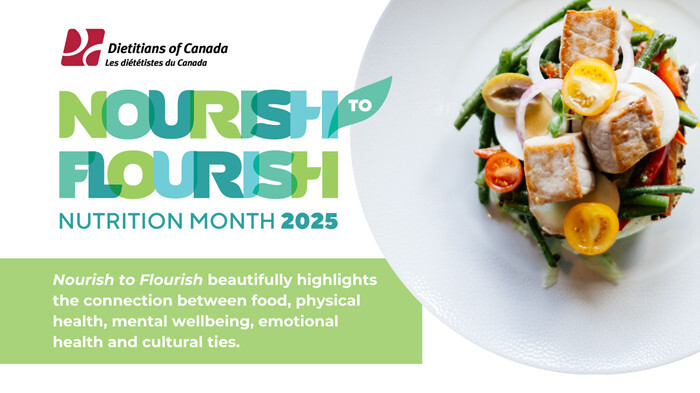
Nourish to Flourish! Nutrition month 2025
This year’s Nutrition month theme is Nourish to Flourish.
As Dietitians, we nourish lives, empower healthier choices, and help our clients flourish every single day – and that is something to celebrate! Nutrition plays a powerful role in helping individuals and communities thrive. Balanced eating supports not only physical health, but also mental well-being, emotional resilience and social and cultural connections. We like to think that we are empowering individuals to find their own pathway to flourishing. And as they nourish – they flourish – as do we!
Physiological Wellbeing
Nutrition is important for good health across the lifespan.
Eating the right kinds and amounts of food provides the necessary vitamins, minerals, essential fatty acids, amino acids, and antioxidants needed by our bodies for growth and repair, physical health and performance, and disease prevention and management. Adequate nutrition is important for supporting health across the entire lifespan, including pregnancy, infant, child and maternal health. It helps prevent malnutrition, both under- and overnutrition, and is needed for a strong immune system, to lower the risk of chronic diseases such as diabetes and cardiovascular disease, and for longevity. Our physical health is mostly what people think of as the rewards of good nutrition – or to translate that further - feeling our best, having energy to do all of things we want to do, moving without joint pain, performing our best, improving our overall quality of life.
Ever wonder how well you are eating? Don’t hesitate to reach out to me to inquire about services provided. So often we think we are eating better than we actually are or on the flipside – we are eating better than we think we are.
Socio-cultural Wellbeing
Food connects families, communities and cultures.
Dietary patterns reflect who we are. From family traditions to cultural and religious practices, food is more than just nutrients – it connects us to our families and communities and helps shape our identities.
Work schedules, cooking skills, lifestyle choices, family dynamics influence food choice, not to mention access to food and budget constraints. We may struggle with knowing how to eat – but our family values, and upbringing also shape our choices.
And food is a part of every celebration in life- from birthdays, holidays, anniversaries, religious holidays and so much more! Perhaps you know what you are missing in your diet but struggle with the social part of eating.
Yes – there is so much more to food, than simply ‘nutrition’.
Mental Wellbeing
Nutrition could be the missing piece of the puzzle for your mental health.
Mental symptoms such as brain fog or lack of focus can be linked to medical conditions that need nutritional management, such as long COVID, ADHD.
A balanced diet can also help improve mental function throughout the life cycle, such as helping kids perform better at school or reducing effects of perimenopause.
Some nutritional strategies have even been found to improve mental health disorders such as anxiety and depression.
Although dietary strategies are often overlooked, they can lead to big improvements in mental well-being.
Emotional Wellbeing
Taking control of our emotional connections with food can support healthier eating.
Emotional eating is part of everyday life. Eating can bring happiness, ease tension and create distraction. People also have positive or negative memories linked with specific food choices that influence their preferences. However, emotional eating can become a problem when feelings are avoided and go straight to eating. This can override hunger cues leading to overeating or unhealthy food choices.
Problems with emotional eating can develop in young children when they are fed using non-responsive / coercive practices by their caregiver. In contrast, children learn to self-regulate their intake when caregivers use feeding practices that support child autonomy.
For adults, understanding emotional connections with food can help promote healthier eating habits by identifying triggers andfinding alternative coping mechanisms for emotional challenges.
I work with adult clients on their emotional eating practices to support their overall nutrition goals. This is one of the most rewarding part of my practice – and it’s also the hardest part for many clients to change.
With the use of a program called “Craving Change” I help clients determine why it’s hard to change, what in their life they need to work on, and then practicing different strategies to support their changes. This all takes time but is so worth it!
So… what have you eaten today? And how do you feel about it. Were there some nourishing foods? Did you enjoy your food? Could you say it helped you to flourish today? I hope so.. and wish you many more good days.
As always don’t hesitate to reach out for support.





